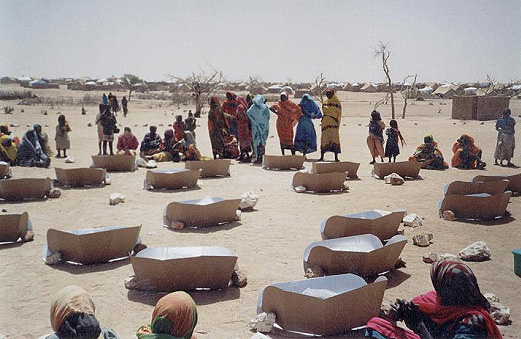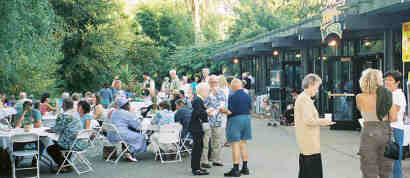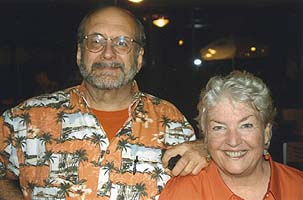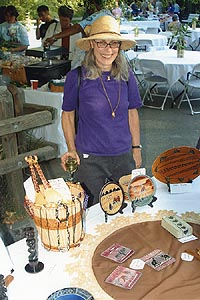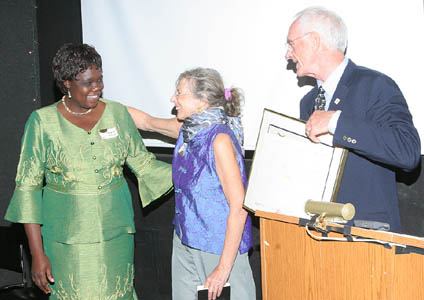| Solar
Cookers International... 1919 21st Street, #101 Sacramento, CA 95811 USA Tel. 916-455-4499 |
Solar Cooker Review November 2005 |
Solar Cooking Archive: |
|
|
|
|
[Editor’s note: "News you send" is compiled by Ramón Coyle, Solar Cookers International’s information exchange specialist. E-mail your news items to ramon@solarcookers.org or mail to Ramón Coyle, Solar Cookers International, 1919 21st Street #101, Sacramento, California 95811-6827, USA. We want to hear from you — especially if your program is growing or if your work has not been featured in the Solar Cooker Review before. Please include your contact information. Submissions are subject to editing if printed. ]
AFRICA
A working group directed by Mr. Harmim Arezki, of the URER/MS renewable energy center in Adrar, is developing and popularizing solar cookers in the Algerian Sahara. Posters and demonstrations at recent symposiums brought solar cooking to the attention of participants, many of whom sampled chicken, eggs, coffee and tea prepared in box- and concentrator-type solar cookers. Contact: Harmim Arezki, URER/MS, BP 478 Adrar 01000, Algeria. Tel: 0213 49 96 51 68, fax: 0213 49 96 04 92, e-mail: aboumouna@caramail.com.
Chad
 Derk Rijks of the KoZon Foundation, and solar cooking trainer Marie-Rose
Neloum, continue to teach solar cooking at the Iridimi camp for refugees from
the Darfur region of Sudan. Nearly 250 panel-type solar cookers have been
distributed to refugees, 50 of which were assembled at the camp. Supplies for an
additional 500 cookers have arrived and production is expected to begin
immediately.
Derk Rijks of the KoZon Foundation, and solar cooking trainer Marie-Rose
Neloum, continue to teach solar cooking at the Iridimi camp for refugees from
the Darfur region of Sudan. Nearly 250 panel-type solar cookers have been
distributed to refugees, 50 of which were assembled at the camp. Supplies for an
additional 500 cookers have arrived and production is expected to begin
immediately.
Demonstrations were also held at Hadjer Hadid for villagers and refugees at the nearby camps at Breidjing and Tréguine. Enthusiasm was clear: "Can't you see that we have no sore eyes, that we do not cough," said a new solar cook. "Don't you realize that we have not had to go out with our donkeys to fetch firewood; don't you see that we can now spend time with our children; don't you see that we have now time to do some sowing or make some basketry and perhaps earn some money." Contact: Derk Rijks by e-mail: rijks.agrometeo@wanadoo.fr; or contact KoZon Foundation, Hollandseweg 384, 6705 BE Wageningen, Netherlands. Tel: 31-317412370, fax: 31-317410732, e-mail: wiewen@bart.nl, Web: www.kozon.org.
Eritrea
 An Eritrea solar cooker project organized by the foundation Solar Cooking
Eritrea Netherlands (SCEN) recently edged out 300 nominees to win an award for
small-scale development projects. The award, presented by Dutch organizations
the National Committee for International Cooperation and Sustainable Development
(NCDO) and the Wild Geese Foundation, carries a monetary value of nearly $6,000.
SCEN won based on project quality, thoroughness of the organization, efficient
working methods, financial transparency, and the "for women, by women" aspect of
the project. This year SCEN hopes to enable 4,500 families to solar cook with
simple panel-type solar cookers based on Solar Cookers International's "CooKit."
Thus far, 1,500 women have been trained, of which 700 have purchased CooKits for
about $3.50 each. A new project coordinator, appointed by the National Union of
Eritrean Women (NUEW), will organize future workshops and follow-up activities,
and supervise a store where solar cookers are produced and sold. Project
beneficiaries include low-income women in the Anseba region, and internally
displaced persons in the Gash Barka zone.
An Eritrea solar cooker project organized by the foundation Solar Cooking
Eritrea Netherlands (SCEN) recently edged out 300 nominees to win an award for
small-scale development projects. The award, presented by Dutch organizations
the National Committee for International Cooperation and Sustainable Development
(NCDO) and the Wild Geese Foundation, carries a monetary value of nearly $6,000.
SCEN won based on project quality, thoroughness of the organization, efficient
working methods, financial transparency, and the "for women, by women" aspect of
the project. This year SCEN hopes to enable 4,500 families to solar cook with
simple panel-type solar cookers based on Solar Cookers International's "CooKit."
Thus far, 1,500 women have been trained, of which 700 have purchased CooKits for
about $3.50 each. A new project coordinator, appointed by the National Union of
Eritrean Women (NUEW), will organize future workshops and follow-up activities,
and supervise a store where solar cookers are produced and sold. Project
beneficiaries include low-income women in the Anseba region, and internally
displaced persons in the Gash Barka zone.
SCEN chairwoman Clara Thomas is currently organizing follow-up meetings with new solar cooks to collect feedback and discuss challenges and success. According to Ms. Thomas, evaluation and adaptation are essential. "In this way," she says, "a tradition of thousands of years of firewood cooking can be transformed to solar cooking with purely the sun as heat source." At least one woman in the Hagaz village seems already convinced. Of her experiences thus far, she says, "We prepare goat, rice, lentils and shiro in the CooKit and the taste is excellent!" Contact: Clara Thomas, Solar Cooking Eritrea Netherlands, Prof. van Reeslaan 11, 1261 CS Blaricum, Netherlands. E-mail: cookit.ned@wanadoo.nl, Web: www.solarcookingeritrea.nl.
Nigeria
 Joseph Odey exhibited solar cookers at the "Fish For All" summit in Abuja,
Nigeria this past August. The summit brought together industry and government
leaders to discuss the current status and future directions of African fisheries
and aquaculture. Mr. Odey estimates that over 90% of the participants witnessed
his exhibit. He says that demand for the solar cookers is high, and he believes
that Nigeria is ripe for solar cooker proliferation, but governmental support is
needed. While speaking with the press, Mr. Odey said, "Nigeria is blessed with
abundant sunshine that will benefit its citizen if the technology is supported
by the government." His efforts to spread solar cookers in Nigeria are currently
under financial restraint, and he is looking for assistance in this regard.
Contact: Joseph Odey, P.O. Box 300, Kainji, New Bussa, Niger State, Nigeria.
E-mail: joeodey2003@yahoo.com.
Joseph Odey exhibited solar cookers at the "Fish For All" summit in Abuja,
Nigeria this past August. The summit brought together industry and government
leaders to discuss the current status and future directions of African fisheries
and aquaculture. Mr. Odey estimates that over 90% of the participants witnessed
his exhibit. He says that demand for the solar cookers is high, and he believes
that Nigeria is ripe for solar cooker proliferation, but governmental support is
needed. While speaking with the press, Mr. Odey said, "Nigeria is blessed with
abundant sunshine that will benefit its citizen if the technology is supported
by the government." His efforts to spread solar cookers in Nigeria are currently
under financial restraint, and he is looking for assistance in this regard.
Contact: Joseph Odey, P.O. Box 300, Kainji, New Bussa, Niger State, Nigeria.
E-mail: joeodey2003@yahoo.com.
THE AMERICAS
Ecuador
 Dr. Fabiola Cuvi, Director of the Ecuadorian Research and Training Institute
(IECAIM), reports that the institute continues to expand its solar program. In
July, IECAIM held its 49th training course on the methodology, construction and
use of solar cookers. Dr. Cuvi says that the students were very happy and
surprised that inexpensive, cardboard box-type solar cookers work so well. The
course ended with a solar feast of fish, potatoes, bananas and broccoli.
Contact: Dr. Fabiola Cuvi, IECAIM, Av. 6 de Diciembre 2817 Y Republica, Quito,
Ecuador. Tel: (593-2) 2 525517, fax: (593-2) 2 569397, e-mail:
fcuvi@iecaim.org,
Web: www.iecaim.org.
Dr. Fabiola Cuvi, Director of the Ecuadorian Research and Training Institute
(IECAIM), reports that the institute continues to expand its solar program. In
July, IECAIM held its 49th training course on the methodology, construction and
use of solar cookers. Dr. Cuvi says that the students were very happy and
surprised that inexpensive, cardboard box-type solar cookers work so well. The
course ended with a solar feast of fish, potatoes, bananas and broccoli.
Contact: Dr. Fabiola Cuvi, IECAIM, Av. 6 de Diciembre 2817 Y Republica, Quito,
Ecuador. Tel: (593-2) 2 525517, fax: (593-2) 2 569397, e-mail:
fcuvi@iecaim.org,
Web: www.iecaim.org.
USA
 On his Food Network television series "BBQ with Bobby Flay," Chef Flay
travels the United States in search of all that is grilled, smoked and
barbecued. ClearDome Solar's "SolaReflex 900" was featured on a recent episode,
taking on traditional charcoal grilling in a head-to-head competition for speed
and flavor. The SolaReflex 900 is a unique concentrator-type solar cooker with
an oval-shaped reflecting dish and off-center hot spot that reflects sunlight
below the center line, minimizing or eliminating energy loss due to pot shadows.
According to inventor Deris Jeannette, the SolaReflex 900 has heating
temperatures comparable to a toaster oven with the pot close to the reflector
(with a seven-inch hot spot), but more like a high temperature gas stove when
it's at the focal point (with a two- to three-inch hot spot). DVD copies of the
five-minute segment are available to educators and solar professionals upon
request. Contact: Deris Jeannette, ClearDome Solar, 3368 Governor Drive, 153-F,
San Diego, California 92122, USA. Tel: 619 990-7977, e-mail:
cleardomesolar@sbcglobal.net,
Web: www.cleardomesolar.com; for information on "BBQ with Bobby Flay," visit
www.foodnetwork.com/food/show_bq.
On his Food Network television series "BBQ with Bobby Flay," Chef Flay
travels the United States in search of all that is grilled, smoked and
barbecued. ClearDome Solar's "SolaReflex 900" was featured on a recent episode,
taking on traditional charcoal grilling in a head-to-head competition for speed
and flavor. The SolaReflex 900 is a unique concentrator-type solar cooker with
an oval-shaped reflecting dish and off-center hot spot that reflects sunlight
below the center line, minimizing or eliminating energy loss due to pot shadows.
According to inventor Deris Jeannette, the SolaReflex 900 has heating
temperatures comparable to a toaster oven with the pot close to the reflector
(with a seven-inch hot spot), but more like a high temperature gas stove when
it's at the focal point (with a two- to three-inch hot spot). DVD copies of the
five-minute segment are available to educators and solar professionals upon
request. Contact: Deris Jeannette, ClearDome Solar, 3368 Governor Drive, 153-F,
San Diego, California 92122, USA. Tel: 619 990-7977, e-mail:
cleardomesolar@sbcglobal.net,
Web: www.cleardomesolar.com; for information on "BBQ with Bobby Flay," visit
www.foodnetwork.com/food/show_bq.
 When it comes to furthering the spread of solar cooking, Sister Theresa Egidy
O.L.V.N. is a star performer. In addition to providing financial support to
Solar Cookers International for more than a decade, she has built and used
several solar cookers. She gives presentations at schools and clubs, and she
created a permanent display of solar cookers and information in her ministry
center. Sister Egidy learned about solar cooking in the late 1980s from SCI
founder Barbara Kerr.
When it comes to furthering the spread of solar cooking, Sister Theresa Egidy
O.L.V.N. is a star performer. In addition to providing financial support to
Solar Cookers International for more than a decade, she has built and used
several solar cookers. She gives presentations at schools and clubs, and she
created a permanent display of solar cookers and information in her ministry
center. Sister Egidy learned about solar cooking in the late 1980s from SCI
founder Barbara Kerr.
Says Sister Egidy, "I am 97 years old, have been in the community 73 years and spent 53 years of that in the missions, teaching the underprivileged, and helping them with necessities. I love every minute of it." Contact: Sister Theresa Egidy, PO Box 109 Victory Noll, Huntington, Indiana 46750, USA.
ASIA/PACIFIC
Israel
The Eretz Natna Yevulah organization made its first solar box cookers several years ago using plans published by Solar Cookers International. They had good success with the cookers, and began conducting construction workshops at ecology centers, festivals and conferences. They struggled to find cardboard boxes of the right dimensions, particularly for the lid, and decided to try a template approach instead. Based loosely on a solar cooker in Joe Radabaugh's book "Heaven's Flame," their design has a slanted top and reflectors on all sides. The cooker's inner and outer boxes, as well as the reflectors and window frame, are cut from cardboard along lines traced from the template pieces. This creates cookers that are of uniform size and shape, allowing for some pieces to be cut prior to workshops and ultimately reducing the amount of time needed at the workshop. According to project representatives Allison and Shmuel Ofanansky, workshops given with this system ran more smoothly than any they had conducted with the traditional box cooker. "The patterns for the inner and outer boxes, with their slanted tops, could be traced on large boxes, cut out and folded into shape with no measuring or re-fitting necessary. The glass could all be cut to the proper size before the workshop. Participants could simultaneously work on various parts of the oven, since there were patterns for each piece. Every oven came out beautifully." For detailed instructions, contact: Shmuel and Allison Ofanansky, Eretz Natna Yevulah, Galilee Restoration Project, PO Box 134, Tzefat, Israel. Tel: 0545 848 353, e-mail: smed@netvision.net.il, Web: www.awish.net/Asia/galilee.htm.
The Penang Girl Guides Association held a solar cooking workshop in July. Forty-two Girl and Ranger Guides attended, aged 13-18 years, from a number of surrounding schools. The workshop began with a cooking demonstration and discussion session, and ended with construction of panel-type solar cookers. Girl Guide leader Joyce Ong Choon Kim says the workshop was fruitful even though the weather was not ideal. The girls will gather again soon for a solar cookout. Contact: Ms. Joyce Ong Choon Kim, Penang Girl Guides Association, 260, Jalan Air Itam, 10460 Penang, Malaysia. E-mail: joyceongck@yahoo.com.
Don and Margaret Messerer continue to lead solar cooking classes and demonstrations in the Philippines. They recently solar cooked a noon-time meal for teachers and school children, consisting of wild and brown rice, chicken breasts in mushroom soup, and fruit and nut muffins. The meal was cooked on the school's roof. Contact: Don Messerer, PO Box 269, Rock Creek, Minnesota 55067, USA.
Sri Lanka
With support from dozens of U.S. and Canadian Rotary clubs, Sun Ovens International has sent 200 of it's high-quality solar box cookers - Global Sun Ovens(r) - to the Help - Sri Lanka Consortium, a grassroots organization working to re-house tsunami victims. The cookers will enable 200 families with newly built homes to fuel an estimated 70% of their cooking with solar energy. Paul Munsen, Sun Ovens International's president, will teach Sri Lankan women how to use the cookers. Additionally, two Sri Lankan orphanages will receive commercial-sized Villager Sun Ovens(r) to cook meals and bake bread to generate income for the orphanages. These large ovens can cook 1,200 meals per day and have a propane backup system. Contact: Paul Munsen, Sun Ovens International, 39W835 Midan Drive, Elburn, Illinois 60119, USA. Tel: (630) 208-7273, fax: (630) 208-7386, e-mail: info@sunoven.com, Web: www.sunoven.com; for information on Help - Sri Lanka Consortium, visit www.rehablanka-tsunami.org.
Vietnam
 The Solar Serve organization reports overwhelming response to a nationally
broadcast television documentary of their work promoting solar cookers around Da
Nang, including many requests to bring solar cooking to southern areas of the
country. As a result, Solar Serve conducted several workshops in Phan Rang, an
area that is "like a desert. Hot, dry and sandy." Water contamination is
rampant, according to Solar Serve. "There is no clean water available but dirty
river water has been pumped into an open drain system. Every day people are
using this water for cooking, drinking and washing." High levels of illiteracy
forced the Solar Serve staff to be creative in their workshops, in which
participants ultimately assembled 100 solar box cookers and several parabolic
cookers. A two-day celebration at the end of the workshops drew over 100 people,
who feasted on solar-cooked fish, beef, curry, vegetables and rice.
The Solar Serve organization reports overwhelming response to a nationally
broadcast television documentary of their work promoting solar cookers around Da
Nang, including many requests to bring solar cooking to southern areas of the
country. As a result, Solar Serve conducted several workshops in Phan Rang, an
area that is "like a desert. Hot, dry and sandy." Water contamination is
rampant, according to Solar Serve. "There is no clean water available but dirty
river water has been pumped into an open drain system. Every day people are
using this water for cooking, drinking and washing." High levels of illiteracy
forced the Solar Serve staff to be creative in their workshops, in which
participants ultimately assembled 100 solar box cookers and several parabolic
cookers. A two-day celebration at the end of the workshops drew over 100 people,
who feasted on solar-cooked fish, beef, curry, vegetables and rice.
Other media coverage and requests for assistance followed on the heels of the television documentary. "The first article was in a major newspaper. People from all over the country started to call the paper. It was so overwhelming that they published a second article and asked the people to contact us directly if they had further questions. From that day we received many telephone calls and a stream of visitors. It was hard who to answer first, the call or the visitor. Almost 100 people wanted to buy a parabolic solar cooker and others wanted us to set up a project with the solar box cookers. Amazing!" To meet the rising demand for solar cookers in Vietnam, Solar Serve will form a new entity to make solar cookers available for sale. The proceeds from cooker sales will directly support the work of Solar Serve. Contact: Tan Bich Nguyen, 222 Nguyen Tri Phuong, Da Nang, Vietnam. Tel: 84-55-520018, e-mail: solarserve@yahoo.com.
Germany
 Düsseldorf-based German Aluminum Association (GDA) has been promoting the
spread of solar cookers for a number of years. GDA recently supplied ten solar
cookers to Nigeria as part of a development aid project, and another ten solar
cookers to the Benedictine Abbey in Ndana, Tanzania. The Benedictine Padre Klaus
Braunreuter from Tanzania says, "The solar ovens mean that we will be able to
prepare the hot meals we provide in our kindergartens and training centers
economically and in a resource-saving manner. In addition, [the cookers] will be
used in our cashew nut project for country women in order to minimize the costs
and time involved in collecting fuel. The use of the ovens will enable us to
introduce structures into our projects that will lead to sustainable
improvements in the circumstances of the children and country women." GDA also
provided 10 solar cookers to Düsseldorf Scouts for World Youth Day. The cookers
will be used to heat water and demonstrate how solar energy can cook, roast and
simmer food. After the event, the cookers will ship to the German Scout
Association Saint George's National Centre at Westernohe in the Westerwald
region. There they will be put to permanent use at Germany's largest camping
site. Contact: Anncathrin Wener, Public Relations, German Aluminium Association,
Tel: (+49) 2 11 - 47 96 282, fax: (+49) 2 11 - 46 96 410, e-mail:
anncathrin.wener@aluinfo.de.
Düsseldorf-based German Aluminum Association (GDA) has been promoting the
spread of solar cookers for a number of years. GDA recently supplied ten solar
cookers to Nigeria as part of a development aid project, and another ten solar
cookers to the Benedictine Abbey in Ndana, Tanzania. The Benedictine Padre Klaus
Braunreuter from Tanzania says, "The solar ovens mean that we will be able to
prepare the hot meals we provide in our kindergartens and training centers
economically and in a resource-saving manner. In addition, [the cookers] will be
used in our cashew nut project for country women in order to minimize the costs
and time involved in collecting fuel. The use of the ovens will enable us to
introduce structures into our projects that will lead to sustainable
improvements in the circumstances of the children and country women." GDA also
provided 10 solar cookers to Düsseldorf Scouts for World Youth Day. The cookers
will be used to heat water and demonstrate how solar energy can cook, roast and
simmer food. After the event, the cookers will ship to the German Scout
Association Saint George's National Centre at Westernohe in the Westerwald
region. There they will be put to permanent use at Germany's largest camping
site. Contact: Anncathrin Wener, Public Relations, German Aluminium Association,
Tel: (+49) 2 11 - 47 96 282, fax: (+49) 2 11 - 46 96 410, e-mail:
anncathrin.wener@aluinfo.de.
Solar cookers in Nyakach: a youth perspective
"People like to cook with it because it makes food ... delicious as honey." - Oliech Joash, Nyakach youth
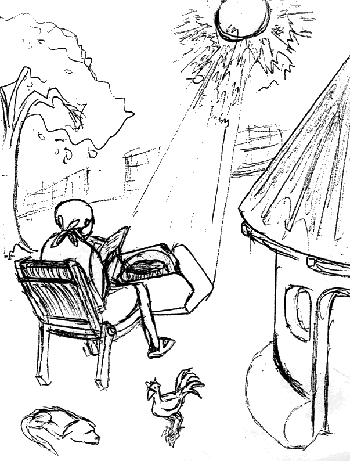 Solar cooker education in schools is important to the long-term acceptance
and spread of solar cookers, and as such it is one component of Solar Cookers
International's Sunny Solutions project in Nyakach, Kenya. Over the last few
months, dozens of Nyakach youth - mostly in their early- to mid-teenage years -
wrote essays on solar cooker topics ranging from how solar cookers work and why
they are important, to personal reflections on the impact of solar cookers in
their own lives. Many of the students also drew pictures, some depicting the
burdens and environmental degradation associated with cooking fuel collection,
others showing solar cookers in action. The essays were a joy to read, and
demonstrate a high level of solar cooking interest and knowledge that can be
shared with families and friends. "I still remember the day when one of the
Sunny Solutions educators came to our school and taught us how the sun can
cook," recalls Philip Bondo. "Our science teacher told us to come out to learn
about 'solar energy,' but we did not know what he meant. As soon as we got out
we saw something that looked like a carton box, but the inside was shiny. After
we made a circle around the box, we all kept quiet so that we could [learn].
Without wasting any time, the visitor began: 'As I come to your school I would
like all of you to know more about solar cookers so that when you go back to
your homes you tell your parents about it." In this way, education can spread
through and beyond schools to the community at large. Excitement over a birthday
memory was evident in an essay, written by Emmaqiulet Ahyango Ramula, containing
this passage: "The thing that I enjoy most when cooked through this solar cooker
is cake which my mother prepared during my happy birthday. I was attentively
watching the way she was cooking it. I keep telling my friends who came to my
birthday that we used solar cooker to cook cakes. They really appreciated and
they encouraged their mothers to buy solar cookers and both their parents have
bought solar cookers and they really enjoy cooking with it."
Solar cooker education in schools is important to the long-term acceptance
and spread of solar cookers, and as such it is one component of Solar Cookers
International's Sunny Solutions project in Nyakach, Kenya. Over the last few
months, dozens of Nyakach youth - mostly in their early- to mid-teenage years -
wrote essays on solar cooker topics ranging from how solar cookers work and why
they are important, to personal reflections on the impact of solar cookers in
their own lives. Many of the students also drew pictures, some depicting the
burdens and environmental degradation associated with cooking fuel collection,
others showing solar cookers in action. The essays were a joy to read, and
demonstrate a high level of solar cooking interest and knowledge that can be
shared with families and friends. "I still remember the day when one of the
Sunny Solutions educators came to our school and taught us how the sun can
cook," recalls Philip Bondo. "Our science teacher told us to come out to learn
about 'solar energy,' but we did not know what he meant. As soon as we got out
we saw something that looked like a carton box, but the inside was shiny. After
we made a circle around the box, we all kept quiet so that we could [learn].
Without wasting any time, the visitor began: 'As I come to your school I would
like all of you to know more about solar cookers so that when you go back to
your homes you tell your parents about it." In this way, education can spread
through and beyond schools to the community at large. Excitement over a birthday
memory was evident in an essay, written by Emmaqiulet Ahyango Ramula, containing
this passage: "The thing that I enjoy most when cooked through this solar cooker
is cake which my mother prepared during my happy birthday. I was attentively
watching the way she was cooking it. I keep telling my friends who came to my
birthday that we used solar cooker to cook cakes. They really appreciated and
they encouraged their mothers to buy solar cookers and both their parents have
bought solar cookers and they really enjoy cooking with it."
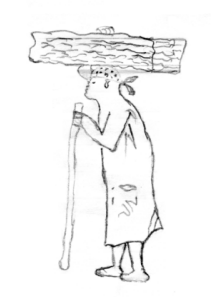 A number of essays describe the health and environmental ramifications of
continued, large-scale use of firewood for cooking. As Olum Omondi Kenneth
writes, "In Kenya we are always using trees as a source of fuel. By using trees,
it has made the rural side of our country to be as remote as a desert, which has
lead to a hostile environment." Otieno Charles Anyango describes health issues
of cooking over smoky fires this way: "During the process, there is a lot smoke,
which brings lung cancer to someone which is very dangerous and they could
easily cough and sneeze." Orieny Frank goes on to say, "The introduction of
solar cookers has been seen by many as a better way of improving life,
especially for a people whose main fuel for many years gone has been firewood. I
have seen this breakthrough as one way of raising the living standards of people
as compared to the past when the use of firewood was the order of the day. Solar
cookers as such save us from the frequent needs to buy fuels, as solar rays that
the equipment use are cost-free. The money which would be used to buy the same
can now be used to satisfy other needs and by so doing, standards of life get
improved." Olweny Daniel's essay shows an understanding of solar energy. He
says, "The sun is the main source of energy on earth. Energy from the sun is
called solar energy. It is given off by nuclear reaction in the sun. This
nuclear energy is then turned into radiant energy. This travels through and some
of it enters the earth's atmosphere."
A number of essays describe the health and environmental ramifications of
continued, large-scale use of firewood for cooking. As Olum Omondi Kenneth
writes, "In Kenya we are always using trees as a source of fuel. By using trees,
it has made the rural side of our country to be as remote as a desert, which has
lead to a hostile environment." Otieno Charles Anyango describes health issues
of cooking over smoky fires this way: "During the process, there is a lot smoke,
which brings lung cancer to someone which is very dangerous and they could
easily cough and sneeze." Orieny Frank goes on to say, "The introduction of
solar cookers has been seen by many as a better way of improving life,
especially for a people whose main fuel for many years gone has been firewood. I
have seen this breakthrough as one way of raising the living standards of people
as compared to the past when the use of firewood was the order of the day. Solar
cookers as such save us from the frequent needs to buy fuels, as solar rays that
the equipment use are cost-free. The money which would be used to buy the same
can now be used to satisfy other needs and by so doing, standards of life get
improved." Olweny Daniel's essay shows an understanding of solar energy. He
says, "The sun is the main source of energy on earth. Energy from the sun is
called solar energy. It is given off by nuclear reaction in the sun. This
nuclear energy is then turned into radiant energy. This travels through and some
of it enters the earth's atmosphere."
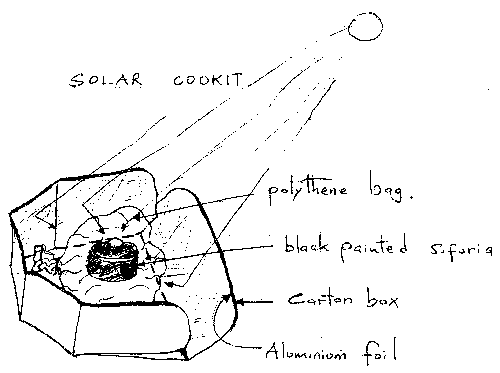 Eunice Adhyambo Odiko summarized many key points as such: "Solar cookers have
many advantages as compared to disadvantages. The first advantage is that while
using solar, one has got free time for doing some duties that could have not
been done when using firewood or charcoal. The other advantage is that the solar
cooker uses the energy from the sun which does not cost any amount. This has
encouraged many Kenyans to buy the cooker because they save the money which
could have been used in buying things like matchbox, charcoal or firewood. Solar
cooker is very reliable in cooking different types of foods like dagaa, roasted
meat, cake, ugali and many others. Foods cooked using solar are very good
because they don't have the taste of smoke."
Eunice Adhyambo Odiko summarized many key points as such: "Solar cookers have
many advantages as compared to disadvantages. The first advantage is that while
using solar, one has got free time for doing some duties that could have not
been done when using firewood or charcoal. The other advantage is that the solar
cooker uses the energy from the sun which does not cost any amount. This has
encouraged many Kenyans to buy the cooker because they save the money which
could have been used in buying things like matchbox, charcoal or firewood. Solar
cooker is very reliable in cooking different types of foods like dagaa, roasted
meat, cake, ugali and many others. Foods cooked using solar are very good
because they don't have the taste of smoke."
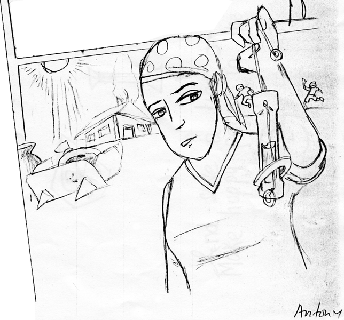
A number of the students thought that Sacramento - the city in which SCI's U.S. office is located - was the name of the inventor of solar cooking. Though not true, it is fun to ponder the day when solar innovators are esteemed to the degree that cities are named after them! In the words of Awino Otieno Erick, "Solar cooking was started by somebody called Sacramento from the USA. In 1987 he was as happy as a lark when he performed this duty." Certainly he was.
OYWA CooKit earns women's innovation award
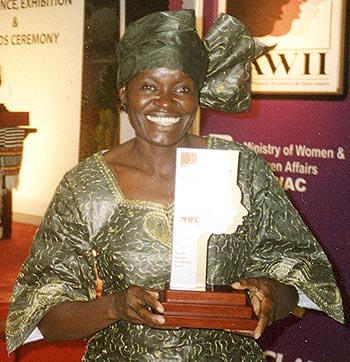 The OYWA CooKit - a solar cooker developed and assembled by women in Nyakach,
Kenya as part of Solar Cookers International's Sunny Solutions project - shows
improvement over factory-built CooKits. It is less expensive, more durable, and
considered by many to be more attractive. (OYWA, in the local Dholuo language,
is a word used to describe people who live in the Nyakach area.) This
innovation, and the women who developed it, received a top award at the
inaugural Pan-African Women Invent and Innovate (PAWII) exhibition, conference,
and awards ceremony held in Accra, Ghana in September 2005. The PAWII awards
were organized by Global Women Inventors and Innovators Network (GWIIN) and
sponsored by the International Finance Corporation (IFC), a private arm of the
World Bank Group. GWIIN finds effective ways of bringing support, assistance,
tools, advice and information to women, helping them achieve significant growth
in their businesses. GWIIN awards are considered the world's leading accolade
for women inventors and innovators. [Below greens cooking up nicely in the OYWA
CooKit]
The OYWA CooKit - a solar cooker developed and assembled by women in Nyakach,
Kenya as part of Solar Cookers International's Sunny Solutions project - shows
improvement over factory-built CooKits. It is less expensive, more durable, and
considered by many to be more attractive. (OYWA, in the local Dholuo language,
is a word used to describe people who live in the Nyakach area.) This
innovation, and the women who developed it, received a top award at the
inaugural Pan-African Women Invent and Innovate (PAWII) exhibition, conference,
and awards ceremony held in Accra, Ghana in September 2005. The PAWII awards
were organized by Global Women Inventors and Innovators Network (GWIIN) and
sponsored by the International Finance Corporation (IFC), a private arm of the
World Bank Group. GWIIN finds effective ways of bringing support, assistance,
tools, advice and information to women, helping them achieve significant growth
in their businesses. GWIIN awards are considered the world's leading accolade
for women inventors and innovators. [Below greens cooking up nicely in the OYWA
CooKit]


Germany to earn CERs through solar kitchens
 German Technical Cooperation (GTZ) has been commissioned by the German
government to devise a Clean Development Mechanism (CDM) project to compensate
for carbon dioxide emissions generated by the "Renewables 2004" conference in
Bonn. The project involves installation of 510 locally-produced parabolic
mirrors to collect solar energy for community kitchens in India. The new systems
will be installed at 16 sites - including hospitals, schools, and temples - in
several Indian states, providing meals and hot drinks for nearly 30,000 people
daily. An estimates 7,820 tons of carbon dioxide equivalents will be saved over
a seven-year period, beginning October 2005. Through the CDM, developed nations
can earn Certified Emission Reductions (CERs) by investing in "clean" projects
in developing nations. CERs help developed nations meet Kyoto Protocol
greenhouse gas reduction commitments. According to The Hindu Business Line
newspaper, Germany is also in the process of buying CERs from the massive "solar
kitchen" at Tirumala Tirupati Devasthanam. This system is comprised of 106
rooftop-mounted parabolic concentrators that generate steam for cooking up to
30,000 meals daily. The large parabolic mirrors, installed by Gahdia Solar,
generate steam for cooking.
German Technical Cooperation (GTZ) has been commissioned by the German
government to devise a Clean Development Mechanism (CDM) project to compensate
for carbon dioxide emissions generated by the "Renewables 2004" conference in
Bonn. The project involves installation of 510 locally-produced parabolic
mirrors to collect solar energy for community kitchens in India. The new systems
will be installed at 16 sites - including hospitals, schools, and temples - in
several Indian states, providing meals and hot drinks for nearly 30,000 people
daily. An estimates 7,820 tons of carbon dioxide equivalents will be saved over
a seven-year period, beginning October 2005. Through the CDM, developed nations
can earn Certified Emission Reductions (CERs) by investing in "clean" projects
in developing nations. CERs help developed nations meet Kyoto Protocol
greenhouse gas reduction commitments. According to The Hindu Business Line
newspaper, Germany is also in the process of buying CERs from the massive "solar
kitchen" at Tirumala Tirupati Devasthanam. This system is comprised of 106
rooftop-mounted parabolic concentrators that generate steam for cooking up to
30,000 meals daily. The large parabolic mirrors, installed by Gahdia Solar,
generate steam for cooking.
More information is available on the GTZ CDM-India Web site: www.cdmindia.com.
Onward toward SCI goals for 2010: technical assistance in four more fuel-scarce, sunny countries
by Bev Blum, Executive Director
In recent Solar Cooker Reviews, I highlighted four of Solar Cookers International's ambitious goals for the year 2010. Brief updates on those are below. The final two goals are to work with partner agencies toward self-sustaining spread in four more countries, and to achieve significant progress in two of them. As a first step, SCI's technical assistance program is short-listing sunny, fuel-scarce target countries and seeking partner agencies from governments, businesses, humanitarian agencies and educational institutions to connect with funders and strong local partners. Priorities include health projects to reduce smoke- and water-related diseases, and women's micro-enterprise projects. These issues have combined nicely in the western Kenya Sunny Solutions project, a joint project with the Nyakach Community Development Association. Nyakach residents wanted affordable solar cookers to address cooking fuel shortages. Thus far, 1,000 families have purchased CooKits for easier cooking. Now they also use the CooKits to pasteurize drinking water and are reducing waterborne diseases, according to a recent study summarized in an upcoming Review. Several Nyakach women earn income by selling CooKits, and are now also making and selling OYWA CooKits - locally produced versions of factory-made CooKits. These attractive, less expensive, more durable CooKits recently earned a prestigious Pan-African Women Invent and Innovate award (see "OYWA CooKit earns women's innovation award,").
Brief updates on other initiatives:
1. Self-sustaining spread of solar cooking and water pasteurizing in Kenya is underway, as projects begin in two new communities this year. 2. Government awareness of and support for solar technologies got a boost as dedicated SCI volunteers from five countries educated government missions at the United Nations in New York in recent months. These volunteers are A.J. Lederman, D. Wang and M. Gilbert (USA), L. Luo (China), A. Jarjun (The Gambia), and D. Gadhia (India). Margaret Owino, SCI's eastern Africa director, assisted in these efforts. 3. Access to solar cooker expertise for educators, researchers, policy makers and consumers continues to broaden. A new DVD about the Sunny Solutions project, underwritten by generous New Yorkers, is forthcoming. 4. Information exchange and collaboration among 700 solar cooker leaders worldwide is expanding. Eight international task forces will bring new recommendations to the worldwide gathering of solar cooker leaders and experts in Granada, Spain next July. (See "Reminder: major conference approaching")
Lastly, on a personal note, when I "unretired" and returned to SCI two years ago my intention was to serve as executive director for another two to three years. These have already quickly passed. The board of directors is now searching for my replacement. I expect to retire soon after the international solar cookers conference next July. SCI is strong, vibrant and growing, and has brought many of my life's most thrilling and inspiring moments. I plan to stay involved as a volunteer, perhaps working with one or more of the international task forces. To all of you who make SCI possible, thanks once again. I wish you a happy and peaceful holiday season, and know you join me in pledging to help make next year SCI's best yet.
Reminder: major conference approaching
A major international solar cookers conference, co-sponsored by Fundació Terra and Solar Cookers International, will be held in Granada, Spain from 12-16 July, 2006. The conference will bring together solar cooker promoters and enthusiasts to share experiences, dissemination strategies, and recent advancements in solar cooking, solar water pasteurization, and related solar food processing applications. The conference will also discuss the role of solar cookers in achieving United Nations Millennium Development Goals (MDGs). The deadline for submitting abstracts of oral or poster presentations has been extended to 1 December, 2005. Further details, including registration information and procedures for submitting abstracts, are available on the conference Web site: www.solarconference.net. Contact: Marta Pahissa, Fundació Terra, Avinyó, 44, 08002 - Barcelona, Spain. Tel: +34 936 011 636, e-mail: solar@terra.org, Web: www.terra.org.
David Ruppe named SCI Volunteer of the Year
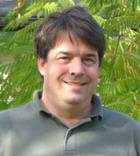 The proverb "better late than never" would apply to this year's awarding of
Solar Cookers International's Volunteer of the Year. For the past 16 years,
graphic designer David Ruppe has donated several hundred hours worth of
professional-quality layout services, enabling SCI to produce the Solar Cooker
Review at reduced cost. David's patience is much appreciated, and his talents
contribute greatly to the overall success of the publication. David owns IMPACT
Publications located in Medford, Oregon (USA), which specializes in promotional
materials for nonprofit arts organizations and public radio stations. David also
designs book covers and illustrates books. We congratulate David, and hope for
his continued support in our endeavors to spread the news of solar cooking
around the world.
The proverb "better late than never" would apply to this year's awarding of
Solar Cookers International's Volunteer of the Year. For the past 16 years,
graphic designer David Ruppe has donated several hundred hours worth of
professional-quality layout services, enabling SCI to produce the Solar Cooker
Review at reduced cost. David's patience is much appreciated, and his talents
contribute greatly to the overall success of the publication. David owns IMPACT
Publications located in Medford, Oregon (USA), which specializes in promotional
materials for nonprofit arts organizations and public radio stations. David also
designs book covers and illustrates books. We congratulate David, and hope for
his continued support in our endeavors to spread the news of solar cooking
around the world.
Barbara Knudson inducted into SCI Order of Excellence
 Solar Cookers International (SCI) recently inducted volunteer Barbara Knudson
into its Order of Excellence. She is the ninth person to earn this honor
recognizing those whose "sustained efforts have contributed most to empowering
people to cook food and pasteurize water with solar energy." Barbara has
extensive experience living and working in developing countries, and is
extremely knowledgeable about international relations and women's issues. Her
first professional job was in a refugee camp in Austria as it was recovering
from World War II. Barbara has worked for the United Nations (UN) on several
occasions. She has traveled widely in Asia and Latin America, and lived for two
years in Africa - a country she has since visited nearly 30 times. Most of her
career was spent as a professor of International Relations and Women's Studies
at the University of Minnesota. Barbara has been an active volunteer in solar
cooker promotion for almost two decades. She was a featured speaker at SCI's
very first conference in 1989, and a couple years later joined its board of
directors, on which she has served for 12 years. Barbara was instrumental in the
early success of SCI's first field project, at Kakuma refugee camp in Kenya. In
the early 1990s, the SCI board of directors searched for a site to field test
its new solar cooker, the "CooKit." In 1994, Barbara and fellow board member
Norge Jerome went to Kenya to network and brainstorm with several potential
partner agencies. When Lutheran World Federation invited SCI to Kakuma, Barbara
visited the camp and prepared for the launch of the project. She was part of the
initial team of trainers that spent two months in Kakuma in early 1995. Within
weeks, UN representatives from Geneva visited the camp and urged SCI to
immediately begin a second project in Dadaab refugee camp, also in Kenya. Later,
Barbara traveled to Paris to negotiate a grant from the UN to begin a project in
Zimbabwe. Barbara returned many times to Kakuma in the following years to
document solar cooker use and firewood savings. In 1998 Barbara helped form the
nonprofit organization Solar Household Energy (SHE), which promotes commercial
dissemination of solar cookers. In 2001 she provided training services to a
Rotary-sponsored solar cooking program in Turkey. Most recently, Barbara has
written a book-length summary of solar cooking activities world wide, available
on the SHE Web site at www.she-inc.org/sam.pdf. Thank you Barbara for your
tireless dedication to SCI and to the promotion of solar cookers worldwide. Many
thousands of families now reap the benefits of cooking with the sun, due in no
small part to contributions you have made.
Solar Cookers International (SCI) recently inducted volunteer Barbara Knudson
into its Order of Excellence. She is the ninth person to earn this honor
recognizing those whose "sustained efforts have contributed most to empowering
people to cook food and pasteurize water with solar energy." Barbara has
extensive experience living and working in developing countries, and is
extremely knowledgeable about international relations and women's issues. Her
first professional job was in a refugee camp in Austria as it was recovering
from World War II. Barbara has worked for the United Nations (UN) on several
occasions. She has traveled widely in Asia and Latin America, and lived for two
years in Africa - a country she has since visited nearly 30 times. Most of her
career was spent as a professor of International Relations and Women's Studies
at the University of Minnesota. Barbara has been an active volunteer in solar
cooker promotion for almost two decades. She was a featured speaker at SCI's
very first conference in 1989, and a couple years later joined its board of
directors, on which she has served for 12 years. Barbara was instrumental in the
early success of SCI's first field project, at Kakuma refugee camp in Kenya. In
the early 1990s, the SCI board of directors searched for a site to field test
its new solar cooker, the "CooKit." In 1994, Barbara and fellow board member
Norge Jerome went to Kenya to network and brainstorm with several potential
partner agencies. When Lutheran World Federation invited SCI to Kakuma, Barbara
visited the camp and prepared for the launch of the project. She was part of the
initial team of trainers that spent two months in Kakuma in early 1995. Within
weeks, UN representatives from Geneva visited the camp and urged SCI to
immediately begin a second project in Dadaab refugee camp, also in Kenya. Later,
Barbara traveled to Paris to negotiate a grant from the UN to begin a project in
Zimbabwe. Barbara returned many times to Kakuma in the following years to
document solar cooker use and firewood savings. In 1998 Barbara helped form the
nonprofit organization Solar Household Energy (SHE), which promotes commercial
dissemination of solar cookers. In 2001 she provided training services to a
Rotary-sponsored solar cooking program in Turkey. Most recently, Barbara has
written a book-length summary of solar cooking activities world wide, available
on the SHE Web site at www.she-inc.org/sam.pdf. Thank you Barbara for your
tireless dedication to SCI and to the promotion of solar cookers worldwide. Many
thousands of families now reap the benefits of cooking with the sun, due in no
small part to contributions you have made.
Shine On '05: a splendid evening
Over 200 local supporters of Solar Cookers International gathered recently at the Sacramento Zoo for good conversation, solar-cooked treats, and inspirational stories of lives made better through solar cooking and solar water pasteurization.
Hal Hammond, owner of Hall Hammond Graphics, and SCI Development Director Virginia Callaghan, enjoying the evening.
Shine On volunteer Alta Tura organized a raffle of African arts and crafts.
SCI's Eastern Africa Director Margaret Owino (left), noted New York City artist Mary Frank (middle), and SCI President Dick Cochran stand before a delighted audience at a preview showing in New York City of a forthcoming DVD about SCI's solar cooker promotion in western Kenya. The video received rave reviews and inspired major contributions in support of its completion.
Leading investors with a charitable gift annuity
 Neva Glenn and her husband Charles have been involved with solar cooking
since 1982. They are also longtime friends of Barbara Kerr and Sherry Cole -
pioneering solar cooker designers and founding members of Solar Cookers
International. The Glenns have now distinguished themselves as the first
participants in SCI's new charitable gift annuity program. Mrs. Glenn is clearly
enthusiastic about this opportunity, stating, "We are more than pleased to
invest in a charitable gift annuity for SCI. This is not only a wonderful
investment, returning a good yearly interest rate for the rest of our lives, but
it keeps your fantastic energy-saving project distributing knowledge and
assistance worldwide. This ... is most desirable!" Thank you Mr. and Mrs. Glenn
for leading this planned giving path with SCI. With a minimum gift of $10,000,
program participants can receive a fixed income - beginning immediately or
deferred to a later date - that is guaranteed for life. Separate trust documents
and annual tax filings are not required. For more information on SCI's
charitable gift annuity program, call Virginia Callaghan at (916) 455-4499.
Neva Glenn and her husband Charles have been involved with solar cooking
since 1982. They are also longtime friends of Barbara Kerr and Sherry Cole -
pioneering solar cooker designers and founding members of Solar Cookers
International. The Glenns have now distinguished themselves as the first
participants in SCI's new charitable gift annuity program. Mrs. Glenn is clearly
enthusiastic about this opportunity, stating, "We are more than pleased to
invest in a charitable gift annuity for SCI. This is not only a wonderful
investment, returning a good yearly interest rate for the rest of our lives, but
it keeps your fantastic energy-saving project distributing knowledge and
assistance worldwide. This ... is most desirable!" Thank you Mr. and Mrs. Glenn
for leading this planned giving path with SCI. With a minimum gift of $10,000,
program participants can receive a fixed income - beginning immediately or
deferred to a later date - that is guaranteed for life. Separate trust documents
and annual tax filings are not required. For more information on SCI's
charitable gift annuity program, call Virginia Callaghan at (916) 455-4499.
Calling all U.S. federal employees!
Over one million U.S. federal employees participate annually in the Combined Federal Campaign (CFC): the world's largest workplace giving campaign. This year federal employees have the option, for the first time, of supporting Solar Cookers International with a one-time gift or recurring payroll deductions through the Aid to Africa Federation. SCI is proud to meet the CFC's rigorous financial, accountability and governance standards. (CFC #9985) More information is available on the Internet: www.africacharities.org/index.shtml.
Does Uncle Harry really need another necktie? Does Aunt Mary really need another box of chocolates? Alternative Gifts International (AGI) offers a different kind of shopping experience. In a market setting, shoppers peruse colorful booths representing humanitarian projects from around the world. Shoppers then select projects they want to support and make a contribution ("purchase a gift"). Contributions to the projects are made in honor of family, friends, business associates, etc., who then receive an attractive gift card explaining the unique gift. Solar Cookers International is honored to again be an AGI beneficiary organization. If you would like to host an alternative gift market, contact Alternative Gifts International, P.O. Box 3810, Wichita, Kansas 67201-3810, USA. Tel: 800-842-2243, e-mail: agi@altgifts.org, Web: www.altgifts.org
Tribute gifts have been given to Solar Cookers International by:
- Gwynne P. Smith in memory of her parents
- George and Gertrude Prosser Kevin Blake in honor of his wife
- Rose Blake Joyce L. Kieffer in honor of Alvin Hecker
- Mary B. Strauss in memory of Raymond Drake
- Paul Council in honor of Daniel Lacroix
- Ronald Pinkerton in memory of Constance McWhinnie
The Unitarian Universalist Church of Davis, California (USA) dedicates one collection each month to nonprofit organizations furthering their values and principles. Solar Cookers International is honored to be a beneficiary organization, receiving over $1,000. Thank you Davis Universalists!
Solar Cooker Review
Solar Cooker Review is published two or three times per year with the purpose of presenting solar cooking information from around the world. Topics include solar cooker technology, dissemination strategies, educational materials, and cultural and social adaptations. From time to time we cover related topics such as women's issues, wood shortages, health, nutrition, air pollution, climatic changes, and the environment. Solar Cooker Review is sent to those who contribute money or news about solar cooking projects. The suggested subscription price is $10/year. Single copies are sent free to select libraries and groups overseas. We welcome reports and commentary related to solar cooking for possible inclusion. These may be edited for clarity or space. Please cite sources whenever possible. We will credit your contribution. Send to Solar Cookers International (SCI), 1919 21st Street #101, Sacramento, California 95811-6827, USA. You may also submit by fax: +1 (916) 455-4498 or e-mail: kevin@solarcookers.org. Solar Cooker Review is compiled and edited by Kevin Porter, SCI's education resources director, with assistance from other staff. Layout is graciously donated by IMPACT Publications located in Medford, Oregon, USA. Solar Cookers International is a 501(c)(3) nonprofit organization assisting communities to use the power of the sun to cook food and pasteurize water for the benefit of people and environments. SCI is a member of InterAction. We do not sell, rent or trade names of our donors. Tax ID # 68-0153141. Solar Cooker Review is available online at solarcooking.org/docs.htm#newsletters.
